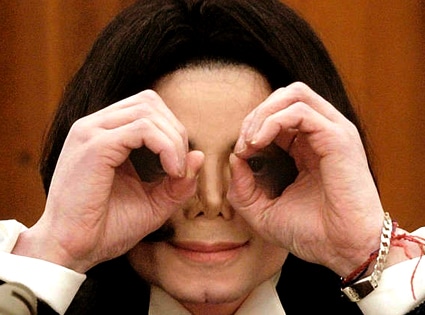 Jim Ruyman/Reuters
Jim Ruyman/ReutersI'm reading all of these awful stories about Michael Jackson in the press. How come they are so mean? He lived the way he wanted to live, and who are we to judge him?
—Anna
OK, here's a question for you: Why is Michael Jackson God all of a sudden? Between swooning (even suicidal) fans and some nearly hysterical celebrities, it's become a near crime to even mention some of the darker facts surrounding Jackson's life:
His trial and acquittal, his debts, his propensity for sleeping in the same bed with minors to whom he was unrelated. Speaking about these things isn't "judging," and it isn't the product of "haters," as the sanctimonious white knights of the Internets have put it. It's a historical record—neither "mean" nor nice—of a public figure.
You wouldn't know that from the way people are behaving, of course—Transformers actor Tyrese Gibson has even ordered fellow performers to cease to speak publicly unless it's to praise Michael Jackson.
Why is the world losing its collective ability for balanced thinking?
According to psychologists and sociological researchers, it's the product of some fairly disturbing—if not simply annoying—phenomena.
First, there's the grief process. According to psychologist Jennifer Hartstein, who has done a lot of grief counseling, the first phase of grief is shock and denial—denial that the person is dead, of course, but more importantly, denial that the person did anything bad.
The general theory, Hartstein explains, is that pondering the negative qualities of the lost person might deepen the brain's shock and inability to cope.
During that period, anyone who steps in and mentions a negative facet of the dead person's life is, essentially, verbally mauled as a way to protect a mourner's nerves.
"It's like your brain almost closes a door and says, 'We can't deal with that, we're going to lock it away until we can deal with it,'" Hartstein explains.
Take '80s child actor Corey Feldman. In 2005, he disclosed that Jackson had shown him dicey photos while the actor was still a minor. ("If you consider it inappropriate for a man to look at a book of naked pictures with a child that's 13 or 14 years old, then your answer would be yes," Feldman told Martin Bashir when asked whether Jackson had ever shown him inappropriate images.)
But now that the pop legend has died, Feldman's current recollection of Jackson appears nothing but positive.
The other reason for the one-way thinking has to do with sociology, researchers tell me. After a major event, individuals jockey for control over the collective memory—how it will be remembered for the rest of time. Any negative memories may be drowned out by obsessive fans, and any other topic of discussion may be frowned upon until the collective memory can be sealed.
Hence we have Transformers' Tyrese, who recently tweeted, "To all artist ONLY talk about Michael Jackson. Your project takes the backseat. I have a #1 film and will ONLY talk about MJ the GR81."
All right, already.
Ask me anything on Twitter @answerbitch